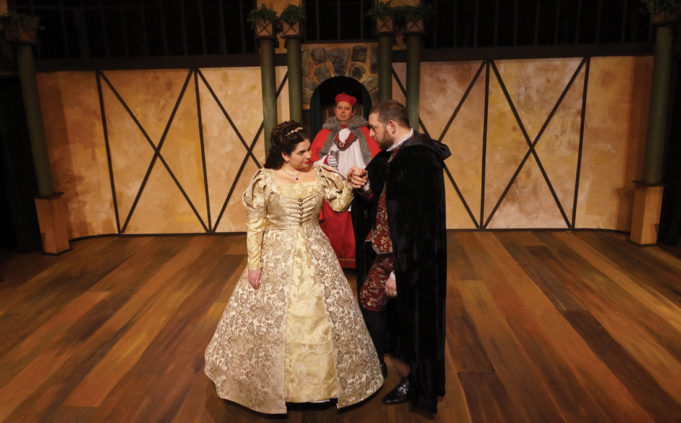Having taken in the literary and film versions of A Man for All Seasons (which adopts Sir Thomas More’s viewpoint) and The Other Boleyn Girl (Mary Boleyn’s), I find it fascinating to see Stolen Shakespeare Guild’s simultaneous productions of two plays that take on whole other perspectives on the reign of King Henry VIII.
Henry VIII is advertised as a work by Shakespeare, but more likely it’s the result of a collaboration between Shakespeare and John Fletcher. (The latter would go on to a more successful and longer-lasting partnership with Francis Beaumont.) Though Queen Elizabeth I was probably already dead by the time the play was staged, the playwrights didn’t have freedom to criticize Henry VIII, her father, nor Thomas Cranmer, the archbishop of Canterbury who baptized her. The play culminates in the birth of the infant Elizabeth, an occasion accompanied by such fulsome praise that the work is like a Nativity play.
Fortunately, Shakespeare and Fletcher provide better political intrigue than Nativity plays. Cardinal Wolsey (Michael Johnson) is portrayed as the serpent in the garden who has earned the enmity of all the lords around the king (Carter Frost), sending an innocent Duke of Buckingham (Andrew Manning) to his death for treason and ruthlessly ousting Katherine of Aragon (Karen Matheny) when Henry takes a liking to Anne Bullen (Jessica Taylor), as the authors spell the famous lady’s surname. Some of the business is fairly un-Shakespearean, such as the prologue and epilogue that proclaim to the audience that this is just a play. (Director Richard Stubblefield gathers the whole cast on stage and divides up the speeches among the actors, which is a mistake.) Despite this, you’ll readily recognize the machinations of power as the jealous nobles plot Wolsey’s downfall.
Henry is not the main character of Henry VIII, just as Julius Caesar isn’t the protagonist of Julius Caesar, but Frost does well to capture the king’s impetuous bursts of rage and emotionality. TJ Bowlin dominates his one turn in the spotlight as Buckingham’s son-in-law the Duke of Surrey, who seizes his chance to gloat over a fallen Wolsey. Still, the best turn comes from Johnson as the cardinal, making the villain brisk, icy, pedantic, impatient with love and sex and everything else that obstructs the running of a government and making him rich. He has some of the weakest material in the play in the form of some pat moralizing as Wolsey repents his wicked ways, and yet Johnson makes this character feel fully realized as the play’s malignant center.
Writers who didn’t have to worry about being sent to the Tower of London are one reason why Wolf Hall is the sharper play. Another reason is that Mike Poulton adapted this from Hilary Mantel’s excellent historical novel about Henry VIII’s reign, and he was free to write dialogue in a more modern, accessible vein. (For the record, I haven’t watched the star-studded BBC TV adaptation of the book, but I’m tempted to now.) The story is told from the point of view of Thomas Cromwell, a shadowy fixer in Henry VIII’s court who strives to cater to the king’s every whim without drawing too much attention to himself the way Wolsey and the prim, priggish Sir Thomas More (Tyler Shults) do.
The play utilizes the same cast as Henry VIII, with everyone portraying different characters, which makes for some intriguing points of comparison. Bert Pigg plays Wolsey as a more expansive and sympathetic churchman, while Bowlin makes a more dandified but no less powerful king than Frost as Frost himself transitions easily into a thuggish Duke of Suffolk. Nolan Shaver is altogether better here as the drunken sad-sack courtier-poet Sir Thomas Wyatt than he is as the straitlaced Cranmer in the Shakespeare play, and Jenna Caire (who barely registers in Henry VIII) turns Anne Boleyn into a royal mean girl who lords over her sister and ladies-in-waiting.
Wolf Hall is hampered by a rickety ending, a regrettable comic caricature of a French factotum (Matt Nugent), and Manning’s lead performance, which doesn’t do justice to the scheming, recessive, wryly funny Cromwell. For all that, it’s still the one to see if you’re only going to one of these shows. These history plays both evoke the environment where a monarch has ultimate power and everyone else is fighting over scraps without being exiled or executed. It’s instructive to see these people maneuver and survive –– or don’t.
Henry VIII and Wolf Hall
Thru Mar 3 at Sanders Theatre, 1300 Gendy St, FW. $16-22. 866-811-4111.












